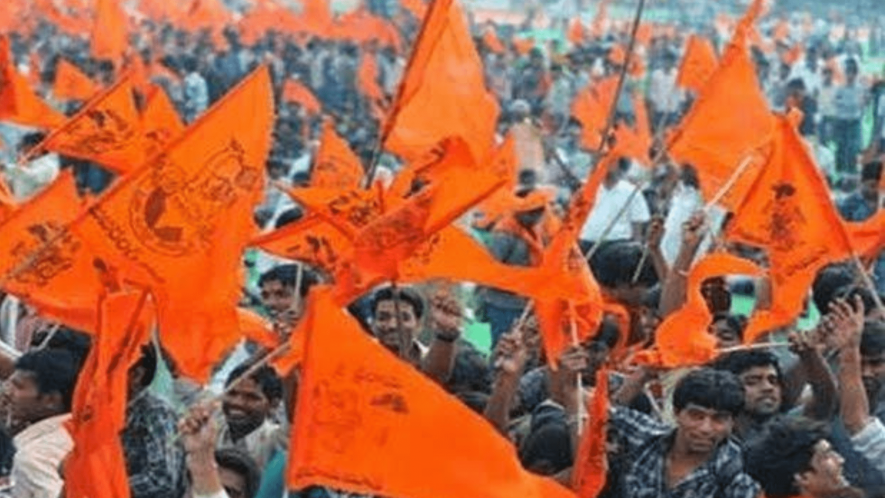Karnataka Polls: Few Takers for Hindutva

Image for representational purpose.(File Image)
New Delhi: Polarisation has reached its saturation point in Karnataka as the state votes on Wednesday with few takers for the BJP’s divisive agenda. The ruling BJP, the opposition Congress and the JD(S) are in a fierce triangular contest.
Junking its general strategy of maintaining silence on Hindutva, especially during elections, the Congress had decided to take it head-on with its manifesto promising to take action against extremist religious organisations like the Bajrang Dal and temporarily-banned Popular Front of India (PFI), etc. However, following a fierce BJP attack, the grand old party went into damage control mode with former Karnataka chief minister (CM) Veerappa Moily denying the suggestion to ban the Bajrang Dal.
Why the Congress initially made such a bold decision—something it cannot even dare to consider in northern states?
If observers are to be believed, Hindutva in Karnataka is not homogenous. It’s embedded with caste, culture and traditions beyond the coastal districts of Udupi, Chikkamagaluru, Mangalore and Shivamogga, where it spread its influence long ago by riding on the back of mobilisation.
The BJP government’s decision to scrap the nearly three-decades-old 4% OBC reservation for Muslims and redistribute it equally among the Veerashaiva-Lingayats and Vokkaligas and raking up the hijab and halal meat issues certainly has an impact on coastal voters.
With former CM and mass leader Siddaramaiah, acceptable across the state, and a strong network of workers under an organised local leadership, the Congress here too does not lag in getting the caste arithmetic in its favour and ensuring the BJP does not get a free pass unlike in other states. It has its own social coalition of OBCs, SCs and Muslims, known as Ahinda. Besides, previous Congress governments were credited with several welfare schemes.
Moving beyond the coastal region, Hindutva’s impact dilutes and revolves around caste identities.
Even in Udupi, where the BJP is strong because of the communal polarisation as a result of Muslims being economically well-off due to easy access to international markets, especially the Gulf, and their larger presence in public spaces, voices like ‘Muslims are well within their right to clothing of their choices’, ‘What matters is their safety and security’ and ‘The BJP is wrong on the hijab controversy’ resonate.
“The hijab ban is unjust. Muslim students wear it just because they feel like wearing it,” an engineering student from Udupi and a first-time voter told Newsclick.
Despite being a Narendra Modi supporter, the student, requesting anonymity, mentioned the state’s “syncretic culture and Kannada pride”. “The bogey of Love Jihad, the controversies on halal and jhatka, narratives such as ‘Hindus are in danger’ and the hatred in the name of nationalism are diversionary tactics to avoid real issues. Being a Brahmin and a supporter of Modi, I rejected the politics of hatred,” she added.
Why does the economic upliftment of Muslims and their larger presence in public spaces such as education, trades and businesses and a network of their organisations cause communal polarisation?
A Mangalore-based professor requesting anonymity explained, “Their noticeable visibility everywhere threatens the homogeneous social space the RSS wants to create.”
Beyond the coastal belt are legends and legacies of a syncretic culture, not Hindutva.
In north Karnataka, which witnessed a Lingayat movement in the 12th century against Brahmanical Hinduism and its Varna system, caste identity dominates along with local issues.
The situation is almost the same in south Karnataka—once an inclusive princely state ruled by liberal rulers who implemented a reservation policy in the 20th century to ensure representation of other castes and demolish the dominance of Brahmins in public services.
Perhaps, that’s why the Havanur Commission on Backward Classes reservation was constituted by the then-Congress CM D Devaraj Urs long before the Mandal Commission. The state also witnessed land reforms in the 1970s.
“Karnataka polls are loud and clear: it’s against uncontrolled corruption and a complete absence of governance. Widespread corruption has started affecting all sections of society. There is a complete collapse of governance. For example, the state government allocated Rs 13,000 crore to alleviate SCs/STs but not even a fraction of the amount has been spent,” advocate Venkatesh Bubberjung, a former public prosecutor in the High Court (HC) of Karnataka, told Newsclick.
“This is not a mere allegation, he claimed, but has also been acknowledged by the BJP leadership. “When Union home minister Amit Shah tells us that the BJP government will make Karnataka corruption-free, he admits there is corruption in the state,” Bubberjung added.
The senior lawyer claimed the people, in general, are “unhappy with the injustice meted out to minorities, especially Muslims, and the state impunity enjoyed by lumpen right-wing groups”.
“I belong to North Karnataka, which has 41 Assembly constituencies and is known for its syncretic culture. It has a good number of dargahs managed by Hindus. So, the BJP’s divisive ideology doesn’t work here,” he said adding that despite being a Brahmin, his mother took him to dargahs instead of temples.
Walking down the memory lane, he said that once a group of Muslims filed a suit in the HC seeking control of a shrine when he was the public prosecutor. “Hindus reached out to me urging to file an injunction for a court direction for proper management of the shrine failing which they would take it over,” he said.
The CM’s [Basavaraj Bommai] statement that he would implement the Yodi Adityanath model in Karnataka if the situation demands has “not gone down well among voters”, he added.
Karnataka, he said, is not a poor state like UP. “We have a higher literacy rate, good per capita income, lower crime rate and higher job opportunities. People from different parts of the country, including UP and Bihar, come here for employment. We have a decades-old IT revolution. It’s foolish that the CM’s made such an ill-informed statement while the UP CM was addressing a poll rally here,” Bubberjung said.
The people of Karnataka, according to him, are much concerned about their cultural issues. They don’t want the “imposition” of the Hindi language on them.
“The Kannada language is thousands of years old. There was a big agitation demanding that signboards should be both in Kannada and English. We don’t have the Devnagari script. We also speak Deccani. The Kannada language has adopted several words from Deccani Urdu and people speak it with pride,” he said stressing the Kannada pride.
Besides culture, Bubberjung said, caste also matters in the state. Last week, Prime Minister Narendra Modi invoked
Bajrang Bali [Hanuman] during one of his public addresses in the state, but “perhaps, he forgot that the Lingayat-dominated areas are influenced by Basavanna, the 12th-century philosopher considered as the founder of the Lingayat sect”.
“He opposed the inequalities of Brahmanical Hinduism and the Varna system and said the concept of God should be done away with. It God exists, the deity should have a physical feature, like the Shivalinga. Therefore, Hinduism is not very acceptable in the region despite many people following its caste system. This is why the Karnataka Assembly doesn’t have any Brahmin MLA,” he added.
When asked about Lingayats seen as a BJP vote bank, Bubberjung said, “The community sided with the saffron party for two reasons: its alienation from the Congress during the Rajiv Gandhi era and the collapse of the Janata Party in the late 1990s—not because they were groomed by the RSS.”
But much has changed, he claimed, as the Congress has also fielded many heavyweight leaders from the community. “The exit of former CM Jagadish Shettar and former deputy CM Laxman Savadi will impact the BJP as both are highly respected community leaders,” he claimed.
Bubberjung said that Shettar not being a mass leader is “propaganda”. “He is among the tallest leaders of the Lingayat community. He has a strong team in the Hubli-Dharward region, the biggest cities after Bengaluru,” he said adding that BJP national general secretary (organisation) BL Santhosh’s statement that “Hindutva is our agenda, not pleasing the Lingayat community” has been taken very seriously.
Get the latest reports & analysis with people's perspective on Protests, movements & deep analytical videos, discussions of the current affairs in your Telegram app. Subscribe to NewsClick's Telegram channel & get Real-Time updates on stories, as they get published on our website.
























